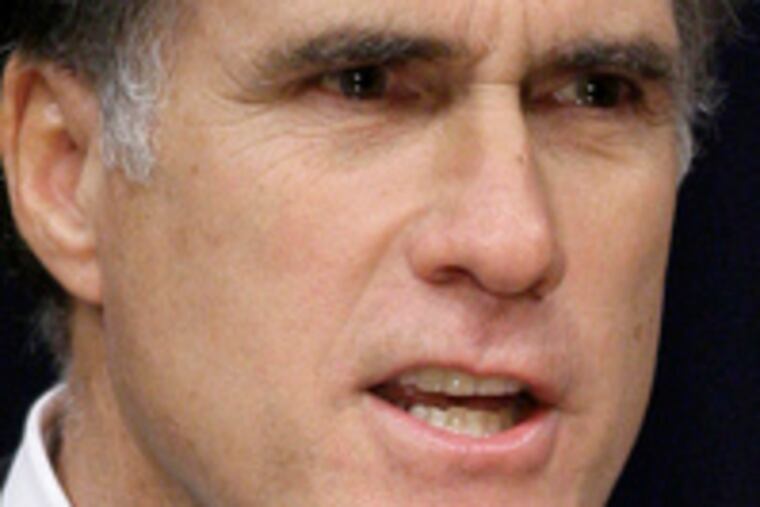One Last Thing | Fun begins as races tighten and shift
For most of the last week at least, Barack Obama and Mike Huckabee have been leading (some of) the polls in Iowa, displacing the long-standing front-runners, Hillary Rodham Clinton and Mitt Romney. But you're not surprised, because you remember the Second Rule of Politics: All races tighten.

For most of the last week at least, Barack Obama and Mike Huckabee have been leading (some of) the polls in Iowa, displacing the long-standing front-runners, Hillary Rodham Clinton and Mitt Romney. But you're not surprised, because you remember the Second Rule of Politics: All races tighten.
Right now, the headline would read:
Clinton OK - and GOP race wide open - no matter what happens.
Except for incumbents and sitting vice presidents, there are no coronations in presidential races. And even those exceptions have exceptions: In 1988, for instance, Vice President George H.W. Bush finished third in Iowa behind both Bob Dole and Pat Robertson. So it was certain the races this year would become competitive in both parties.
Let's start with the Democrats. Clinton retains a sizable national lead. She had been leading in Iowa since August, but now most polls show Obama with a two- to four-point edge. Clinton's support has remained relatively constant, hovering in the middle to high 20s. But Obama has picked up strength as John Edwards has faded, and undecided voters have begun hopping down from the fence.
The Clinton campaign seems panicked by these numbers, launching attacks against Obama for being overly ambitious and for having a long-standing plan to run for president. (Psychologists call this "projecting.") But they needn't worry so.
Sure, it'd be great for Clinton to win Iowa - that would be a huge blow to Obama and would place him in a position where he would need to win New Hampshire (where Clinton has a big lead) just to stay in the race. But even a second-place finish would leave Clinton in a strong position. Losing Iowa is hardly the kiss of death for a Democratic hopeful. There have been six caucuses since 1972 without a Democratic incumbent president or vice president. Only two of them were won by the eventual nominee: Walter Mondale in 1984 and John Kerry in 2004. Clinton, Dukakis, Carter, and McGovern all finished second or third in Iowa.
Second place in Iowa would harbor irritants. Let's say the finish is Obama-Clinton-Edwards. The Edwards campaign was predicated on winning Iowa. If he finishes third, he won't last much past New Hampshire - which means that the anti-Clinton vote will consolidate sooner rather than later.
Now for the Republicans. Mitt Romney's candidacy has never actually caught on. As of a few weeks ago, he sat in fourth place in most national polls. But he's been leading Iowa since May. How's that? Because Romney tried to buy the Iowa caucus.
Early on, Romney decided that his only plausible path to the nomination was to win Iowa, win New Hampshire, and then use those victories to slingshot his candidacy nationally. To that end, he has dumped dollars into Iowa by the planeload: As of mid-November, he had spent $10.2 million on television ads, mostly in Iowa and New Hampshire. For some perspective, the second-biggest TV spender on the Republican side has been John McCain, who as of mid-November had spent only a little more than $300,000.
For his money, Romney was able to buy an early Iowa lead. But that's gone now. Mike Huckabee began rising in early October and now has a lead in Iowa of three to five points in the two most worthwhile polls, Rasmussen and the Des Moines Register, respectively. Romney's support has dipped a little, but hasn't collapsed. Huckabee's rise has come somewhat at the expense of Fred Thompson; mostly it's undecideds breaking Huckabee's way.
It's unclear how far Huckabee's momentum can take him. He remains a long shot to win the nomination, and he has yet to take a punch. That punch probably won't come from the mainstream media, which see him as the weakest Republican and thus a good matchup for either Clinton or Obama.
Which is why Romney's surrogates, such as talk show host and blogger Hugh Hewitt, have gone into overdrive attacking Huckabee during the last week. But Romney's problem isn't Huckabee - it's Romney. One of the striking aspects of the Romney campaign is how his national poll numbers remained stagnant even as he used money to move his Iowa and New Hampshire numbers. Huckabee is proof that a good candidate shouldn't have this dichotomy. While spending almost no money, Huckabee has taken off in Iowa - and, correspondingly, his national numbers have boomed. In the latest Rasmussen poll, Huckabee surged to 18 percent, leaving Romney in fifth place. So far, Republican voters just aren't keen for Romney, and in a national primary process, no amount of money can hide that fact.
The rest of the Republican field is fighting over third place in the Hawkeye State. Thompson and Rudy Giuliani are both sitting around 12 percent. Thompson says he needs to finish third to have a chance to win the nomination; conventional wisdom has it that there are only three tickets out of Iowa. But that may not be right. If Romney wins Iowa, third place becomes very important. If Huckabee wins, then the Romney campaign becomes a ghost ship - which gives Giuliani, Thompson, and McCain all room to grow as Romney's New Hampshire support becomes unmoored.
The fun begins Jan. 3, when upward of 200,000 Iowans brave the cold to help select our next president. Which means that, with less than a month to go, there's still plenty of time for the field to shift again.